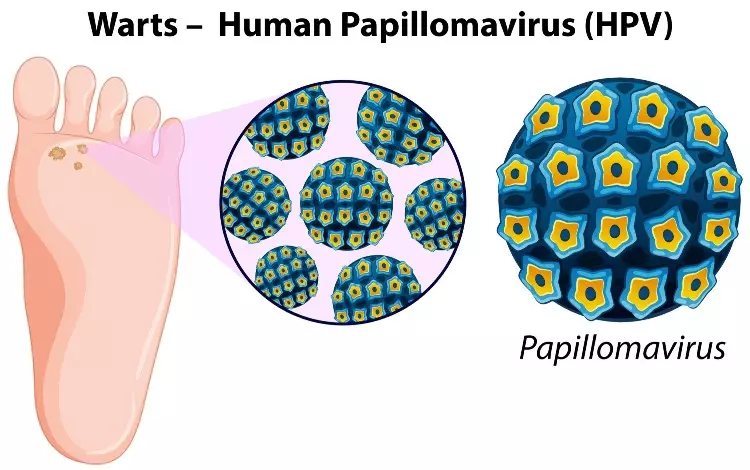
Photo Credit: by brgfx, freepix.com
Human papillomavirus (HPV) is one of the most common viruses which includes over 100 strains that cause warts on the hands, feet, face, and genital area. Some types of HPV can cause different types of cancer, including cervical, vulvar, vaginal, penile, anal, and some head and neck cancers. While not all HPV strains have been associated with cancer, it is important to know your risks and seek treatment. Genital HPV infections can pose a cancer risk while plantar foot HPV infections pose a minimal cancer risk. Here are some key points to know about HPV and warts:
HPV warts can occur anywhere on the body but this article will focus on Genital and Plantar warts.
Plantar Warts:
● Plantar warts are benign growths that develop on the soles of the feet, particularly on the balls and heels of the feet.
● HPV enters the skin through tiny cuts or breaks on the bottom of the feet.
● Plantar warts can be painful, especially when walking or standing, as they are pushed inward beneath a hard, thick layer of skin.
● These warts often appear as small, rough growths with a grainy texture. They may have black dots in the center, which are clotted blood vessels.
Treatment options include:
● Apple cider vinegar: Apple cider vinegar (ACV) is a popular home remedy for plantar warts. To use ACV, dilute two parts ACV with one-part water, soak a cotton ball in the solution, put the cotton ball on the wart directly, and cover the area with a strong tape or bandage. ACV is readily available and very affordable, so it might be worth trying it before considering more expensive treatments. Apple cider vinegar to remove warts: Effectiveness and side effects.
● Salicylic acid: Salicylic acid is a common over-the-counter treatment for plantar warts. It works by softening the wart and gradually removing layers of dead skin.
● Prescription-strength wart medication such as Cantharone These medications work similarly to over-the-counter options, but can penetrate deeper into the skin, peeling away more layers of the wart.
● Cryotherapy: Cryotherapy involves applying liquid nitrogen to the wart, either with a spray or a cotton swab. This freezing treatment destroys the wart tissue, causing it to eventually fall off.
● Laser treatment: Pulsed-dye laser treatment is another option for removing plantar warts. The laser burns closed tiny blood vessels, causing the infected tissue to die and the wart to eventually fall off.
● Minor surgery: In some cases, minor surgery may be necessary to remove the plantar wart. This can involve cutting away the wart or using an electric needle to destroy it.
Genital Warts:
● Genital warts are a sexually transmitted infection caused by certain types of HPV.
● They appear as small, usually painless, hard nodules with rough surfaces and are found only in the genital area.
● Genital warts can affect the vulva, vagina, cervix, penis, scrotum, and anus.
● These warts are highly contagious and can be transmitted through sexual contact or from a mother to her baby during childbirth.
● It is important to seek medical attention for the diagnosis and treatment of genital warts. Treatment options include topical medications such as Vyloma, Aldabra (Imiquimod) as well as cryotherapy, laser therapy, or surgical removal.
Treatment Options for Genital Warts Include
1. Apple cider vinegar: Apple cider vinegar is a popular home remedy for genital warts. To use ACV, clean the area of skin with warts and apply apple cider vinegar on the warts with a cotton swab. Leave it for about 10-15 minutes and wipe with a dry cloth. Doing this thrice a day for at least a week will turn the surface of the wart into a dry scaly tissue that can be peeled off easily. Holding a cotton swab dipped in apple cider vinegar against the wart with a tape for about 2-3 hours can help in severe cases of warts. However, it is important to wash away the vinegar as it can burn the healthy portion of the skin if retained for long.
2. Prescription medication: Prescription medication such as Vyloma, Aldabra and Imiquimod can be applied directly to the warts. These medications can reduce the appearance of warts and the length of each outbreak.
3. Surgical removal: Surgical removal is also possible for genital warts, and doctors usually perform it while a patient is under local anesthesia.
4. Immunotherapy: Interferon is a treatment that can boost the body's immune reaction to the wart. Other forms of immunotherapy may also be effective for treating genital warts.
This article is meant for informative purposes only. It's important to consult with a healthcare professional for an accurate diagnosis and to determine the most appropriate treatment option for plantar warts and genital warts
###
Your email address will not be published. Required fields are marked with *.